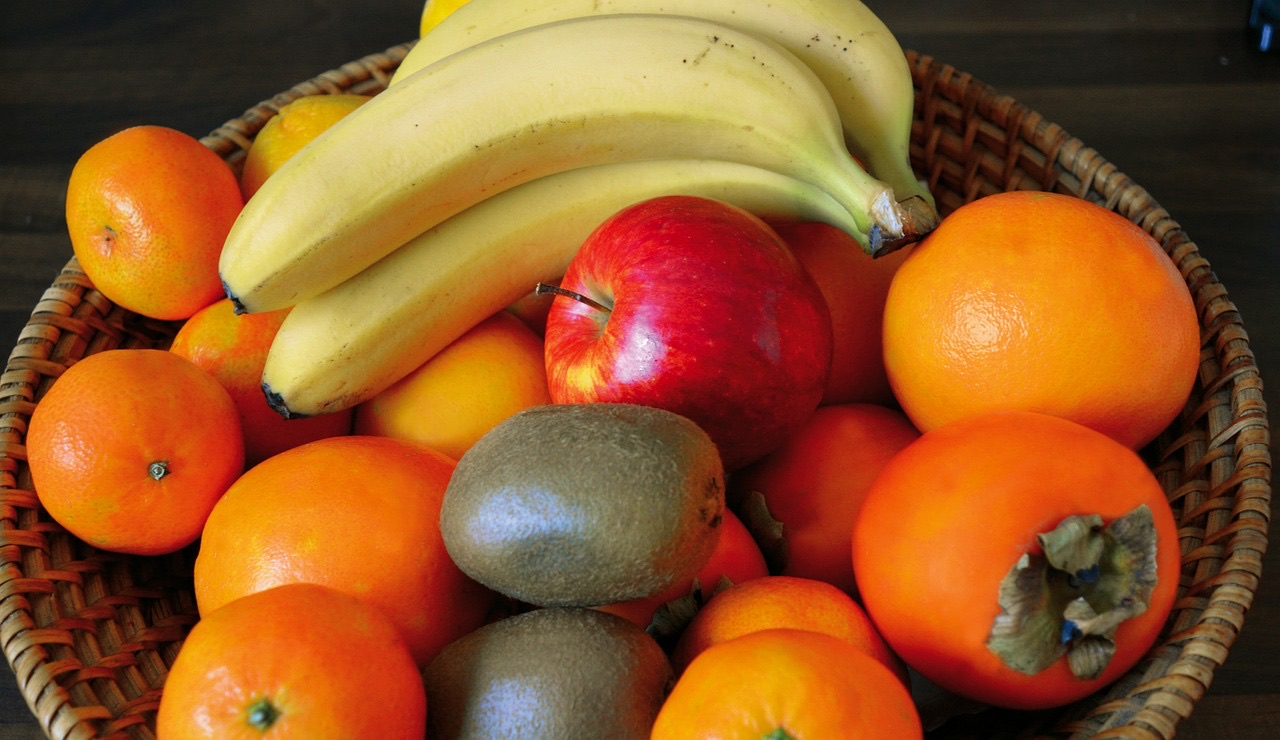Table of Contents
Introduction
In recent times, the importance of gut health has become widely recognised for overall wellness and nutrition. With continued research revealing the intricate connections between the gut and general health, more individuals are seeking ways to enhance their digestive systems.
One effective strategy is incorporating gut-friendly fruits into one’s diet.
Our gut, often referred to as our “second brain,” plays a crucial role in numerous functions, such as digestion, nutrient absorption, immune system regulation, and even mood stabilisation.
A balanced gut microbiome—the community of beneficial microorganisms residing in our digestive tract—is essential for maintaining this delicate ecosystem.
While a well-rounded diet is vital for gut health, certain fruits stand out for their ability to support and enhance our digestive well-being.
This article will explore 7 fruits that can significantly improve gut health, and discuss their benefits.
7 Fruits for Gut Health
- Berries (strawberries, blueberries, raspberries)
Berries, especially blueberries, are often considered superfoods and for good reason.
Strawberries, blueberries, and raspberries are small, vibrant fruits with low calorie content but high nutrient content, making them an excellent choice for promoting gut health.
Fibre Content:
Blueberries contain approximately 2.4 g of fibre per 100 g, including both soluble and insoluble fibre that work together to support digestive health.
Sugar Content:
Blueberries contain approximately 10 g of sugar per 100 g. Although this may seem high, it is important to note that these are natural sugars accompanied by fibre, which helps slow down their absorption and prevents sudden spikes in blood sugar levels.
Key minerals and vitamins:
- Vitamin C: A powerful antioxidant that supports immune function.
- Vitamin K: Important for blood clotting and bone health.
- Manganese: Essential for metabolism and bone formation.
- Small amounts of other minerals like iron, calcium, and zinc.
Polyphenols and other beneficial compounds:
Blueberries are rich in polyphenols, particularly anthocyanins, which give them their deep blue colour. These compounds have potent antioxidant and anti-inflammatory properties. They also contain other beneficial substances like pterostilbene and resveratrol.
Specific benefits for gut health:
The combination of fibre and polyphenols in blueberries makes them excellent for gut health. The fibre acts as a prebiotic, feeding beneficial gut bacteria. The polyphenols, particularly anthocyanins, have been shown to increase the population of Bifidobacterium, a type of beneficial gut bacteria. This can lead to improved gut barrier function, reduced inflammation in the digestive tract, and they have been linked to improved brain function and heart health.
- Apples
The adage “an apple a day keeps the doctor away” might have more truth to it than we realised, especially when it comes to gut health. Apples are not only widely available and easy to incorporate into our diets, but they also offer a range of benefits for digestive wellness.
Fibre content:
Apples contain about 2.4 g of fibre per 100 g, like blueberries. However, a medium-sized apple (about 182 g) provides around 4.4 g of fibre, significantly contributing to the daily recommended intake. Apples are particularly rich in a type of soluble fibre called pectin.
Sugar content:
Apples contain approximately 10.4 g of sugar per 100 g. Like blueberries, this sugar is naturally occurring and comes packaged with fibre and other nutrients, making apples healthier than processed sweet snacks.
Key minerals and vitamins:
- Vitamin C: Important for immune function and skin health.
- Potassium: Essential for heart function and muscle contractions.
- Small amounts of various B vitamins, vitamin K, and minerals like copper and manganese.
Polyphenols and other beneficial compounds:
Apples are rich in polyphenols, particularly flavonoids like quercetin, catechin, and chlorogenic acid. They also contain pectin, which is both a fibre and a polyphenol.
Specific benefits for gut health:
Apples are particularly beneficial for gut health due to their high pectin content. Pectin is a type of soluble fibre that acts as a prebiotic, feeding beneficial gut bacteria. As these bacteria ferment the pectin, they produce short-chain fatty acids (SCFAs) like butyrate, which nourish the cells lining the colon and may help prevent colon cancer.
The polyphenols in apples, particularly chlorogenic acid and catechin, have been shown to inhibit the growth of pathogenic bacteria while promoting the growth of beneficial bacteria like Lactobacillus and Bifidobacterium. This can help maintain a healthy balance in the gut microbiome.
They also have antioxidant properties that help protect the body against oxidative stress.
Moreover, the combination of soluble and insoluble fibre in apples promotes regular bowel movements and helps prevent constipation. The insoluble fibre adds bulk to the stool, while the soluble fibre helps retain water, making the stool easier to pass.
It is worth noting that much of an apple’s beneficial fibre and its polyphenols are found in or just under the skin, so eating apples with the skin on provides most of the gut health benefits.
- Kiwi
Often overlooked, this small, fuzzy fruit is a nutritional powerhouse that offers significant benefits for gut health.
Fibre content:
Kiwi contains about 3 g of fibre per 100 g. A medium-sized kiwi (about 69 g) provides around 2 g of fibre. Kiwi contains both soluble and insoluble fibre, including a unique type of fibre called actinidin.
Sugar content:
Kiwi contains approximately 9 grams of sugar per 100 g. This natural sugar is balanced by the fruit’s fibre content and other nutrients.
Key minerals and vitamins:
- Vitamin C: Kiwi is an excellent source, with one medium fruit providing more than the daily recommended intake.
- Vitamin K: Important for blood clotting and bone health.
- Potassium: Essential for heart function and blood pressure regulation.
- Vitamin E: An antioxidant important for skin health and immune function.
Polyphenols and other beneficial compounds:
Kiwi contains various polyphenols, including flavonoids and carotenoids. It also contains actinidin, an enzyme that aids in protein digestion.
Specific benefits for gut health:
Kiwi is particularly beneficial for gut health due to its unique combination of fibre and actinidin. The fibre acts as a prebiotic, feeding beneficial gut bacteria. These bacteria play a role in maintaining gut health, supporting immune function, and synthesising certain vitamins. The actinidin enzyme can help break down proteins in the gut, potentially easing digestion and reducing bloating.
Studies have shown that regular consumption of kiwi can increase the frequency of bowel movements and improve stool consistency in people with constipation. The fruit has also been found to reduce inflammation in the gut and improve the overall balance of the gut microbiome.
- Bananas
Bananas are often celebrated for their convenience and nutritional value, but they are also excellent for gut health.
Fibre content:
Bananas contain about 2.6 g of fibre per 100 g. A medium banana (about 118 g) provides around 3.1 g of fibre. Bananas are particularly rich in a type of fibre called resistant starch, especially when they are not fully ripe.
Sugar content:
Bananas contain approximately 12.2 g of sugar per 100 g. Bananas have a higher sugar content compared to other fruits, but it is balanced out by their fibre content and other nutrients.
Key minerals and vitamins:
- Potassium: Bananas are famous for their high potassium content, which is essential for heart health and blood pressure regulation.
- Vitamin B6: Important for brain development and function, and helps the body produce serotonin.
- Vitamin C: Supports immune function and skin health.
- Magnesium: Essential for bone health and energy production.
Polyphenols and other beneficial compounds:
Bananas contain various polyphenols, including catechins and dopamine. They also contain pectin and resistant starch, both of which have prebiotic properties.
Specific benefits for gut health:
Bananas are particularly beneficial for gut health due to their resistant starch content. This type of starch resists digestion in the small intestine and reaches the large intestine largely intact, where it acts as a prebiotic, feeding beneficial gut bacteria.
As bananas ripen, some of the resistant starch converts to sugar, but they still retain significant prebiotic benefits. The pectin in bananas also acts as a prebiotic and may help reduce inflammation in the gut.
They are also gentle on the stomach, making them a good choice during digestive upsets and potassium in bananas can help replace electrolytes lost during bouts of diarrhoea or vomiting.
- Pears
Pears are another excellent fruit for promoting gut health. Their sweet flavour and versatile nature make them an easy addition to many diets.
Fibre content:
Pears are one of the highest-fibre fruits, containing about 3.1g of fibre per 100 g. A medium pear (about 178 g) provides around 5.5 g of fibre, which is a significant portion of the daily recommended intake.
Sugar content:
Pears contain approximately 9.8 g of sugar per 100 g. Like other fruits, this sugar comes with fibre and nutrients that help moderate its absorption.
Key minerals and vitamins:
- Vitamin C: Important for immune function and skin health.
- Vitamin K: Essential for blood clotting and bone health.
- Potassium: Helps regulate blood pressure and supports heart function.
- Copper: Important for forming red blood cells and maintaining nerve cells and the immune system.
Polyphenols and other beneficial compounds:
Pears contain various polyphenols, including flavonoids like quercetin, kaempferol, and isorhamnetin. They also contain pectin, a type of soluble fibre with prebiotic properties.
Specific benefits for gut health:
The high fibre content in pears, particularly pectin, makes them excellent for gut health. This fibre acts as a prebiotic, feeding beneficial gut bacteria and promoting their growth. As these bacteria ferment the fibre, they produce short-chain fatty acids that nourish the cells lining the colon.
Pears have been shown to have a laxative effect, helping to relieve constipation and promote regular bowel movements. The combination of soluble and insoluble fibre in pears adds bulk to the stool and helps it retain water, making it easier to pass.
The polyphenols in pears also contribute to gut health by reducing inflammation and oxidative stress in the digestive tract. Studies suggest that these compounds may help protect against colon cancer.
- Pineapples
Pineapples are tropical fruits known for their sweet-tart flavour and juicy texture. They are not only delicious but also offer several health benefits, including some advantages for digestive health.
Fibre content:
Pineapples contain about 1.4 g of fibre per 100 g. A cup of pineapple chunks (about 165 g) provides around 2.3 g of fibre. While this is lower than some of the other fruits we discussed, pineapples still contribute to daily fibre intake.
Sugar content:
Pineapples contain approximately 9.9 g of sugar per 100 g. This natural sugar is balanced by the fruit’s fibre content and other nutrients.
Key minerals and vitamins:
- Vitamin C: Pineapples are an excellent source of vitamin C, important for immune function and skin health.
- Manganese: Essential for metabolism and bone formation.
- Vitamin B1 (Thiamine): Important for energy metabolism.
- Copper: Necessary for forming red blood cells and maintaining nerve cells and the immune system.
- Potassium: Helps regulate blood pressure and supports heart function.
Polyphenols and other beneficial compounds:
Pineapples contain various polyphenols, including flavonoids like quercetin. However, their most notable compound is bromelain, a mixture of enzymes that has various health benefits.
Specific benefits for gut health:
• Digestive enzymes: The bromelain in pineapples is a proteolytic enzyme, meaning it helps break down proteins. This can aid digestion, potentially reducing bloating and discomfort after meals, especially protein-rich meals.
• Anti-inflammatory properties: Bromelain has been shown to have anti-inflammatory effects, which could be beneficial for conditions like inflammatory bowel disease.
• Fibre content: While not as high in fibre as other fruits, the fibre in pineapple still contributes to overall gut health by promoting regular bowel movements and feeding beneficial gut bacteria.
• Hydration: Pineapples have a high-water content, which can help prevent constipation and support overall digestive health.
• Potential prebiotic effects: Studies suggest that pineapple may have prebiotic effects, potentially promoting the growth of beneficial gut bacteria.
It is worth noting that while pineapple can be beneficial for many people, some individuals may find that the high acidity of pineapple irritates their digestive system, especially if consumed in large quantities.
Helps in Weight Loss: Low in calories and high in fibre, pineapple makes a satisfying snack that aids weight loss by promoting fullness and aiding digestion.
Incorporate pineapple into your diet to experience these amazing health benefits while indulging in its deliciously sweet and tangy taste.
- Oranges
Oranges are citrus fruits renowned for their refreshing taste and abundant vitamin C content. They are widely consumed and offer numerous health benefits, particularly for digestive health.
Fibre content:
Oranges provide approximately 2.4 g of fibre per 100 g. A medium-sized orange (about 131 g) contains approximately 3.1 g of fibre, primarily in the form of soluble fibre, especially pectin.
Sugar content:
Oranges contain around 9.4 g of sugar per 100 g. The fruit’s fibre content and other nutrients balance out the natural sugar.
Key minerals and vitamins:
- Vitamin C: Oranges are exceptionally rich in vitamin C, which is crucial for immune function and skin health.
- Thiamine (Vitamin B1): Important for energy metabolism.
- Folate: Essential for cell growth and DNA formation.
- Potassium: Helps regulate blood pressure and supports heart function.
- Calcium: Important for bone health.
Polyphenols and other beneficial compounds:
Oranges are rich in various polyphenols, including flavonoids such as hesperidin and naringenin. They also contain other antioxidants, including beta-carotene and beta-cryptoxanthin.
Specific benefits for gut health:
• Prebiotic effects: The soluble fibre in oranges, particularly pectin, acts as a prebiotic, feeding beneficial gut bacteria. This can help promote a healthy balance of gut microbiota.
• Digestive support: The fibre in oranges helps promote regular bowel movements and can help prevent constipation.
• Anti-inflammatory properties: The flavonoids in oranges, particularly hesperidin, have been shown to have anti-inflammatory effects, which could be beneficial for gut health.
• Hydration: Oranges have high water content, which can help prevent constipation and support overall digestive health.
• Immune support: While not directly related to gut health, the high vitamin C content in oranges supports immune function, which is closely tied to gut health.
• Low FODMAP fruit: For those following a low FODMAP diet for digestive issues, oranges are well-tolerated in moderate amounts.
• Potential protection against H. pylori: Some studies suggest that compounds in citrus fruits may help protect against Helicobacter pylori, a bacterium that can cause stomach ulcers.
It is worth noting that while oranges are beneficial, some people may find that the acidity of citrus fruits irritates their digestive system, especially if consumed in large quantities or on an empty stomach.
Remember, while orange juice is popular, it is better to eat the whole fruit to benefit from the fibre content and to avoid consuming too much sugar at once. The fibre in whole oranges helps slow down the absorption of sugars, making it a healthier choice than juice alone.

Conclusion
Incorporating these seven gut-friendly fruits into your diet can lead to enhanced digestive health. From the prebiotic fibres in apples and pears to the unique enzymes in pineapples, each of these fruits provides its own set of benefits for your gut microbiome and overall digestive wellness.
It is important to remember that a healthy gut encompasses more than just avoiding digestive discomfort; it is a crucial aspect of overall health, affecting everything from the immune system to mental well-being. By choosing these nutrient-dense, fibre-rich fruits, you are not only satisfying your taste buds but also nourishing the complex ecosystem within your digestive system.
The aim is to eat a diverse, balanced diet that supports gut health and overall well-being. These seven fruits are an excellent starting point, offering a delicious way to increase your fibre intake, nourish beneficial gut bacteria, and obtain a wide range of essential nutrients and beneficial compounds.
Therefore, the next time you are looking for a snack, consider reaching for one of these gut-friendly fruits. Your taste buds and gut will appreciate it.



